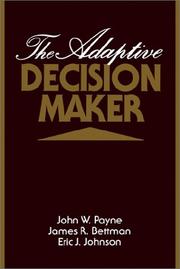| Listing 1 - 10 of 20 | << page >> |
Sort by
|
Film
Year: 2011 Publisher: London : Henry Stewart Talks Ltd,
Abstract | Keywords | Export | Availability | Bookmark
 Loading...
Loading...Choose an application
- Reference Manager
- EndNote
- RefWorks (Direct export to RefWorks)
Film
Year: 2011 Publisher: London : Henry Stewart Talks Ltd.,
Abstract | Keywords | Export | Availability | Bookmark
 Loading...
Loading...Choose an application
- Reference Manager
- EndNote
- RefWorks (Direct export to RefWorks)

ISBN: 0470990074 Year: 1976 Publisher: Hillsdale Erlbaum
Abstract | Keywords | Export | Availability | Bookmark
 Loading...
Loading...Choose an application
- Reference Manager
- EndNote
- RefWorks (Direct export to RefWorks)
Cognitive psychology --- Social psychology --- Cognition --- Congresses --- 159.95*1 --- 159.923.33 --- -Social psychology --- -Mass psychology --- Psychology, Social --- Human ecology --- Psychology --- Social groups --- Sociology --- Cognitieve psychologie --- Sociale invloeden op het karakter. Sociale psychologie--(invloed van de omgeving op het individu;z.o.{316.6}) --- Congresses. --- -Cognitieve psychologie --- 159.923.33 Sociale invloeden op het karakter. Sociale psychologie--(invloed van de omgeving op het individu;z.o.{316.6}) --- 159.95*1 Cognitieve psychologie --- -159.95*1 Cognitieve psychologie --- Mass psychology

ISBN: 0521415055 0521425263 1139173936 9780521425261 Year: 1993 Publisher: Cambridge Cambridge University press
Abstract | Keywords | Export | Availability | Bookmark
 Loading...
Loading...Choose an application
- Reference Manager
- EndNote
- RefWorks (Direct export to RefWorks)
The Adaptive Decision Maker argues that people use a variety of strategies to make judgments and choices. The authors introduce a model that shows how decision makers balance effort and accuracy considerations and predicts which strategy a person will use in a given situation. A series of experiments testing the model are presented, and the authors analyse how the model can lead to improved decisions and opportunities for further research.
Adaptability (Psychology) --- Decision making --- Adaptation (Psychologie) --- Prise de décision --- Decision Making --- Prise de décision --- Deciding --- Decision (Psychology) --- Decision analysis --- Decision processes --- Making decisions --- Management --- Management decisions --- Choice (Psychology) --- Problem solving --- Adaptation (Psychology) --- Adaptive behavior --- Flexibility (Psychology) --- Malleability (Psychology) --- Personality --- Adjustment (Psychology) --- Health Sciences --- Psychiatry & Psychology --- Decision making.
Book
Year: 2001 Publisher: Chicago: University of Chicago press,
Abstract | Keywords | Export | Availability | Bookmark
 Loading...
Loading...Choose an application
- Reference Manager
- EndNote
- RefWorks (Direct export to RefWorks)
Book
Year: 1771 Publisher: London: Printed for J. Payne, and sold by J. Johnson,
Abstract | Keywords | Export | Availability | Bookmark
 Loading...
Loading...Choose an application
- Reference Manager
- EndNote
- RefWorks (Direct export to RefWorks)
Book
Year: 2001 Publisher: Chicago (Ill.) University of Chicago Press
Abstract | Keywords | Export | Availability | Bookmark
 Loading...
Loading...Choose an application
- Reference Manager
- EndNote
- RefWorks (Direct export to RefWorks)
Digital
Year: 2018 Publisher: Cambridge, Mass. National Bureau of Economic Research
Abstract | Keywords | Export | Availability | Bookmark
 Loading...
Loading...Choose an application
- Reference Manager
- EndNote
- RefWorks (Direct export to RefWorks)
Life annuities can be a valuable component of the decumulation stage of wealth during retirement. While economists argue that most retirees should annuitize, actual demand in the marketplace is low. We analyze data from two studies to determine how measurable individual differences among consumers affect their interest in annuities. We find that a relatively high percentage of respondents dislike all annuities. Demographic factors are not predictive of which individuals dislike annuities, and individual factors predicted by economic models to be important (such as beneficiaries) have small or even opposite effects. The strongest individual differences we measured that predicts liking of annuities is the respondent's perception of product fairness. We discuss implications of our findings for financial planners hoping to help their customers with these decumulation challenges.
Book
Year: 2001 Publisher: Chicago, Ill. University of Chicago Press
Abstract | Keywords | Export | Availability | Bookmark
 Loading...
Loading...Choose an application
- Reference Manager
- EndNote
- RefWorks (Direct export to RefWorks)
Book
Year: 2001 Publisher: S.l. Journal of Consumer Research
Abstract | Keywords | Export | Availability | Bookmark
 Loading...
Loading...Choose an application
- Reference Manager
- EndNote
- RefWorks (Direct export to RefWorks)
| Listing 1 - 10 of 20 | << page >> |
Sort by
|

 Search
Search Feedback
Feedback About UniCat
About UniCat  Help
Help News
News